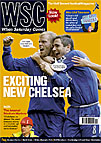 Lokomotive Leipzig used to play in European finals; now they are dominating the equivalent of a pub league. Julius Bergmann reports on a remarkable renaissance
Lokomotive Leipzig used to play in European finals; now they are dominating the equivalent of a pub league. Julius Bergmann reports on a remarkable renaissance
When at the beginning of October FC Lokomotive Leipzig overcame Eintracht Grossdeuben reserves at the city’s new Central Stadium, it wasn’t just the world record crowd for an 11th division match of 12,421 that made the game special; it was also the simple fact that Lok were playing.
There can be few clubs in Europe who can lay claim to more unfulfilled potential or pure misfortune than Lokomotive. Founded in 1896 as VfB Leipzig, they won the first German championship before wars and totalitarian dictatorships hindered their natural development. European success as Lokomotive in the 1970s and 80s gave way to post-reunification heartache as VfB. When the club were formally wound up in June 2004 while in the fourth division, it appeared as if 108 years of footballing tradition had come to an end. Yet under the surface the rumblings had already began.
As bankruptcy approached, a collection of supporters registered the name Lokomotive Leipzig and when VfB were wound up the club was reborn. As a new club Lokomotive had no claim to VfB’s league place and so were condemned to start 2004-05 in the third Kreisklasse, the 11th and bottom division in German football – effectively a pub reserve league. A club who in 1937 won the second German Cup, who in 1987 lost to Ajax in the Cup-Winners Cup final and who just six seasons earlier were in the Bundesliga would be playing in parks on Sundays. Or rather, would, once they had a squad.
The fans spent the summer repairing the stand, weeding the terracing, fundraising and building a team. More than 100 hopefuls turned up for trials and Lokomotive assembled a decent sixth-division squad, ready for the 11th. On a wet Friday evening in late August, Bruno Plache Stadium prepared itself for the first competitive encounter, a Stadtpokal (national cup) first-round clash with TSV Böhlitz Ehrenberg; not quite the 1974 UEFA Cup semi-final against Spurs, but just as important a milestone.
Such a game would normally bring in a couple of dogs and the odd obsessive. The club themselves expected a few hundred spectators. Fifteen minutes before the scheduled start, the queue was still winding its way down the street outside. The game finally kicked off 20 minutes late in front of 3,500. For the first home league game of the season, more than 5,000 turned up to watch Lok win 17-1; the first away match saw 2,000 squeezed into a ground with a 1,400 capacity; a week later, 3,500 celebrated as 62-year-old ex-East Germany international Henning Frenzel came off the bench to score his first goal at Bruno Plache for a couple of decades. Before the season the club had anticipated an average home gate of 300. The first four home league matches of the season have brought in 25,349; and in total the first eight league games have been watched by 33,249, who have seen 85 goals for Lok and five conceded.
For now all is rosy and everyone is happy. But the dilapidated state of the Bruno Plache Stand, the crumbling concrete terracing, the neo-Nazi fan element and the monkey chants for opposition black players are all problems the club have yet to overcome.
As the biggest city in the former DDR, Leipzig wants a Bundesliga team. The city fathers would rather they were local rivals FC Sachsen who are currently mid-table in the fourth level Oberliga with an average home gate of 6,000, but Lokomotive may soon catch them up. The club are actively searching for a merger with a smaller club higher up to avoid the slow slog through the league system, a former chairman is coming back as shirt sponsor and they are even turning their attentions towards Europe, with a proposed friendly against AFC Wimbledon.
In mid-November Germany entertain Cameroon in Central Stadium and will use Bruno Plache as a training ground. Built inside the old concrete monster that once staged DDR international matches, the new ground represents part of the city’s future and will be the only eastern German venue for the 2006 World Cup. Many assumed Lokomotive, too, belonged to the past; many would rather they did; but as the supporters’ banners say: “Helden sterben, Legenden nie” (“Heroes die, legends live forever”).
From WSC 214 December 2004. What was happening this month